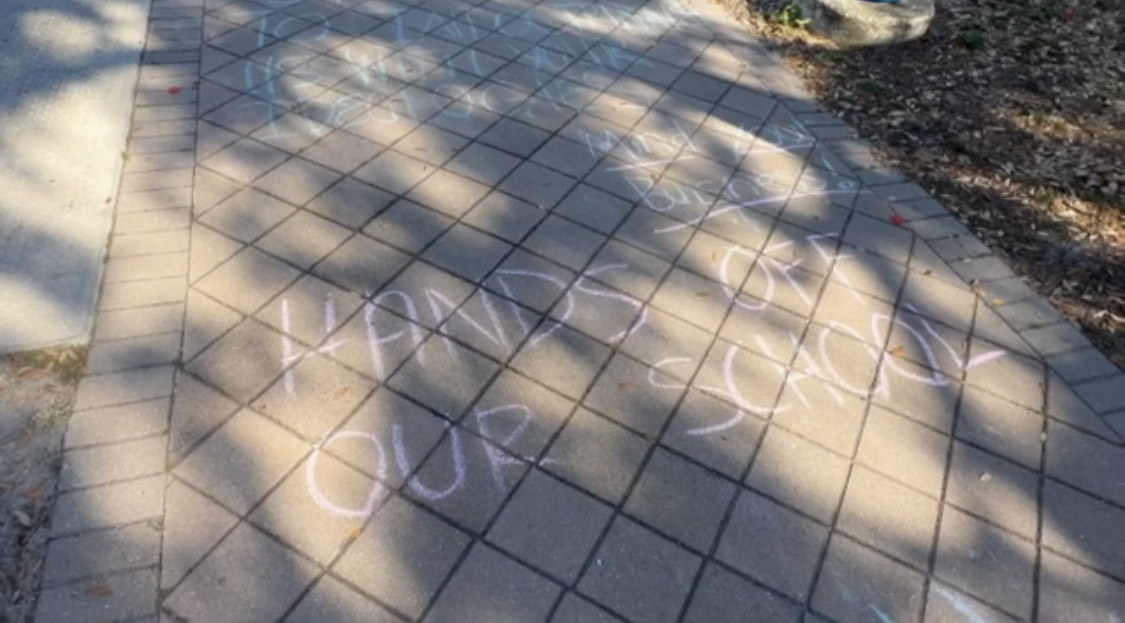On Mar. 21, the Catalyst first reported on the removal of chalk art on campus, speaking with student workers tasked with clean-up efforts as well as Campus Police Department (CPD) officers. Despite this, community members have still felt confused by the academic and legal policies surrounding chalking and its potential grounds for erasure. In further efforts to clarify the fine line between what qualifies as appropriate chalking and art that requires removal, a Catalyst reporter spoke to Chief Financial Officer (CFO) and VP of Finance and Administration Chris Kinsley.
“Chalking has been happening here at New College for as long as anyone can remember,” Kinsley mentioned. “I think that concerns in the past have been that somebody writes something defamatory towards another student or a faculty member, or something that seems threatening. So, usually nothing has happened [with the police in the past] unless the actual content of the chalking seems to be what they term ‘criminal mischief.’”
The term “criminal mischief” previously appeared in an email interview with Chief Jennifer Coley. Coley cited Florida State Statute (F.S.S.) 806.13 and stated that chalking on campus is a violation, saying that “when we find any chalking, we have been instructed to create a work order to have the chalk removed immediately.” Although here, Kinsley states that chalking incidents have involved police in the past only when the content of the chalk necessitates it.
“The big uptick in chalking happened around the time of the appointment of the new trustees and that first Board of Trustees (BOT) meeting,” Kinsley continued. “My interest in chalking has been from the Facilities/Management side, which reports to me, and the campus police side, which reports to me.”
“What was different about the most recent chalking is that it was happening right in front of doorways, particularly Sudakoff and the chalk was getting tracked into the building and it was causing cleaning problems.,” Kinsley continued. “If that type of chalking is people expressing their viewpoint, I have no problem with that; but the people who are physically having to do the clean-up work are the people who have probably the least voice of anybody.”
Kinsley’s primary focus is on sparing the time and efforts of the Physical Plant staff when it comes to chalking. When it comes to police involvement in campus chalking, Kinsley believes that it’s something that should be looked at on a case-by-case basis.
“I have asked campus police to continue to use their best judgment and consult with some chiefs at other universities and get a sense of how it’s [chalking] treated at other campuses, because bigger schools have more experience with dealing with these kinds of incidents,” Kinsley said. “They really do want to focus on protecting lives, campus safety and harm against property… Chalking is something that if it’s not taking place in front of a building, Facilities can just pressure wash it in the normal type of sidewalk cleaning that they do. It’s not some emergency situation. Every chalking incident is not a criminal incident.”
Through this logic, the CPD is given the power to moderate the content of chalk to determine if it is defamatory, hate speech or potentially harmful to an individual’s safety or greater campus safety. Kinsley continued to speak on how important it is to him that the custodial staff not have to do more work than they should, and how campus chalking might be affected by this mindset.
“As a practical matter, when we do have a BOT meeting or some other big event, I’ve asked Physical Plant to hose down the area before the event,” Kinsley stated. “If there’s going to be chalking, I’d rather just not have it be in front of the doorway. I feel like I have to be somewhat protective of my custodial staff and not have them doing extra work.”
The primary reason that chalk erasure has attracted so much attention from students and faculty is due to a collective concern surrounding free speech on campus. Prior to the chalk removal being explained, the community voiced worries that traditionally accepted methods of expression would no longer be welcome on campus. In an interview with Director of Gender Studies and Professor of French Language and Literature Amy Reid, she discussed the merits of chalking and the long history New College has had with the colorful art form.
“One of the real joys of teaching at New is that students speak their minds in and out of class,” Reid shared. “Chalking is a part of that. I think of chalking as a long-standing NCF tradition, and it should be unregulated as a class of constitutionally protected free speech.”
As previously stated, Kinsley posits that he and the administration consider chalking unproblematic so long as the content is appropriate. When asked if he would ever consider starting efforts on establishing a free-speech chalking zone on campus, Kinsley replied,
“I would like to be part of a conversation, but at the end of the day, as the CFO, my job is to manage what the college says is its policy. If the college established a free-speech zone, I would make sure custodians didn’t pressure wash it, or at least not immediately. Whatever policies the college adopted, whether I personally think they’re terrific or I think they’re not, it’s not my job to say ‘I don’t like that policy, so I’m not going to enforce it.’ That goes not just for me, but the whole division of administration.”

